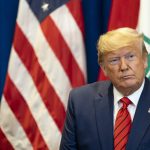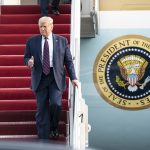President Donald Trump is once again stepping into the Middle East fray, meeting with King Abdullah II of Jordan to discuss his latest plan for the Israel-Palestine conflict. Despite the historic animosities and incessant challenges in the region, there is a glimmer of hope emanating from Amman. King Abdullah is optimistic that Trump might just be the man to broker a peace deal, as he rallies support from neighboring countries to accept Gazan refugees and invest in the region’s reconstruction. Because what’s a conflict without a little real estate development, right?
The backdrop of this meeting is an ongoing conflict, complicated by Hamas’ stubborn grip on hostages and unwillingness to adhere to ceasefire agreements. Hamas accused Israel of breaking the deal first, suggesting that both sides are engaging in a ruthless game of finger-pointing. Meanwhile, Trump, fresh off a ceasefire negotiated by his envoy, is brainstorming radical proposals that include relocating Gazans to Egypt and Jordan. This has made some Arab nations raise their eyebrows suspiciously, fearing that this might just be a cleverly disguised attempt at Israeli annexation.
The King of Jordan no longer outright rejects Trump's Gaza plan.
Instead he calls for Egypt and Jordan to enter negotiations with the US to find an agreement.
This is a MASSIVE breakthrough from last week when they threatened war over this.
Is this The Art of the Deal? pic.twitter.com/CzSpl710Gc
— 𝗡𝗶𝗼𝗵 𝗕𝗲𝗿𝗴 ♛ ✡︎ (@NiohBerg) February 11, 2025
King Abdullah, however, remains undeterred, extending optimism toward Trump’s capabilities as a peacemaker in the tumultuous Middle East. The Jordanian monarch even hinted at the necessity of “collective responsibility” among Arab nations to work hand in hand with Trump. To kick off goodwill, he signaled that Jordan would take in 2,000 Palestinian children suffering from critical medical conditions—a move that seemed to catch Trump off guard, perhaps suggesting that it’s always good to have a humanitarian angle handy when discussing geopolitics.
Despite the upbeat tone, Jordan’s official stance hasn’t entirely shifted toward the radical restructuring of the region. Abdullah emphasized the kingdom’s opposition to settlement expansions and expressed a firm rejection of any plans to forcibly displace Palestinians. One wonders if the king is stuck straddling a fence—looking to the West for support while keeping his own people satisfied. The whole dance is ever so delicate, especially with Trump hinting at the possibility of reallocating military aid if Jordan and Egypt don’t get on board with his plan. Because nothing says “teamwork” like a little carrot-and-stick approach.
Egypt, on the other hand, remains a tough nut to crack. The regime led by Abdel Fattah el-Sisi has been vocally opposed to accepting any refugees, even deploying troops to their borders to keep them at bay. Unlike Jordan, who seems willing to play ball—at least outwardly—the Egyptians appear unyielding, despite maintaining cordial relations with Washington. The upcoming discussions between Arab leaders will be pivotal, and it remains to be seen whether Egypt can be persuaded to accept Trump’s vision.
Rumors swirl that Trump’s strategy hinges on a ceasefire that holds, but with Hamas playing its usual games, the prospects don’t look great. As the deadline to return hostages looms, Trump has made it clear that failure to comply will result in him pulling out the big guns—metaphorically, of course. The stakes are high, and if there’s one thing Trump has made clear, it’s that he’s no fan of wishy-washy diplomacy. If this plan implodes, it wouldn’t just be another talking point; it could genuinely lead to escalated chaos in a region that has weathered enough storms already. As they say, “Only time will tell,” but in this case, one could be forgiven for wishing for a little more optimism and a lot less drama in the days to come.




